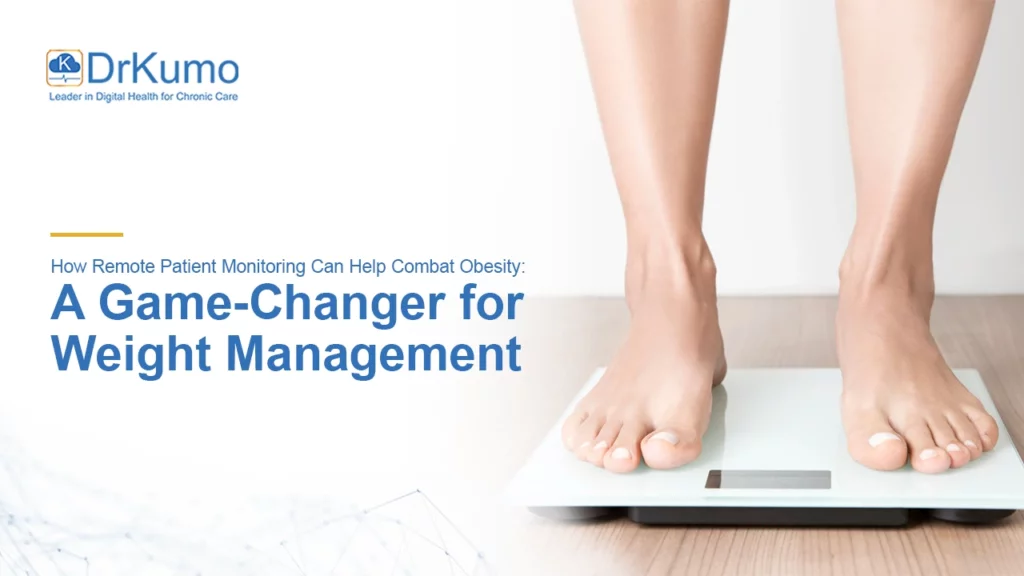Obesity has reached epidemic proportions worldwide, posing severe health risks such as diabetes, heart disease, and various cancers. These growing rates highlight the urgent need for effective interventions.
As healthcare systems strive to address this urgent issue, Remote Patient Monitoring (RPM) has emerged as a transformative digital health solution. By integrating innovative technologies, RPM offers new avenues for managing weight effectively, bridging the gap between patients and healthcare providers.
Individuals managing obesity can now access personalized care and real-time support, free from the constraints of traditional healthcare settings. RPM not only enhances patient engagement but also facilitates tailored interventions that can lead to sustainable weight loss and improved health outcomes.
Discover how Remote Patient Monitoring is revolutionizing weight management, and learn how you can leverage this game-changing technology to take control of your health journey today!
Understanding the Obesity Epidemic
According to the CDC, new population data from 2022 show adult obesity prevalence is alarmingly high in many states across the U.S., with 22 states reporting rates at or above 35%. The economic burden of obesity is staggering, costing nearly $173 billion annually in medical expenses. These statistics underscore the urgent need for effective interventions that can help individuals achieve and maintain a healthy weight.
Myths and Facts about Diabetes Related to Obesity and Weight Changes
Understanding the connection between diabetes and obesity is crucial for effective prevention and management. Here are some common myths and the corresponding facts:
- Myth: Only overweight people get diabetes.
- Fact: While being overweight increases the risk of developing type 2 diabetes, individuals of any weight can develop the condition. Many people who are overweight do not develop diabetes, and some individuals of normal weight can still be diagnosed with it.
- Myth: Eating too much sugar causes diabetes.
- Fact: Sugar itself does not directly cause diabetes. However, a diet high in sugary foods can lead to weight gain, which is a significant risk factor for type 2 diabetes.
- Myth: All people with diabetes need to follow a special diet.
- Fact: People with diabetes can eat the same foods as everyone else. The key is moderation and making healthy choices, focusing on whole grains, vegetables, and fruits while managing carbohydrate intake.
- Myth: If I lose weight, I won’t get diabetes.
- Fact: While weight loss can significantly reduce the risk of developing type 2 diabetes, it does not guarantee prevention. Other factors such as genetics, age, and lifestyle also play important roles.
- Myth: People with diabetes should avoid all carbohydrates.
- Fact: Carbohydrates are an essential part of a balanced diet for everyone, including those with diabetes. The focus should be on portion control and choosing healthier carbohydrate sources.
By debunking these myths, individuals can better understand their health risks and make informed choices regarding diet and lifestyle to manage or prevent diabetes effectively.
The Role of Remote Patient Monitoring
Remote Patient Monitoring involves using digital technologies to collect and transmit health data from patients to healthcare providers. This continuous connection allows for real-time tracking of vital metrics such as weight, blood pressure, and physical activity levels. RPM empowers healthcare providers to oversee patient progress closely, enhancing accountability and adherence to weight loss plans.
Key Benefits of RPM in Weight Management
- Real-Time Monitoring: RPM enables healthcare providers to monitor patients’ health metrics continuously. This real-time data collection allows for timely interventions when patients deviate from their weight loss plans. For instance, if a patient’s weight begins to plateau or increase, healthcare providers can quickly identify and address potential issues.
- Personalized Care Plans: By analyzing individual patient data—such as age, medical history, lifestyle choices, and dietary habits—healthcare professionals can create tailored treatment plans that resonate with each patient’s unique needs. This personalized approach significantly enhances the effectiveness of weight management strategies.
- Enhanced Engagement and Accountability: RPM tools foster greater patient engagement by allowing individuals to actively participate in their health journey. With mobile apps and wearable devices that track physical activity and dietary intake, patients become more accountable for their progress. Regular self-weighing using connected scales has been shown to correlate with greater weight loss success.
- Accessibility and Convenience: RPM breaks down barriers to care by enabling patients to manage their weight from the comfort of their homes. This is particularly beneficial for those living in rural areas or those with mobility challenges who may find it difficult to attend regular in-person appointments.
- Behavioral Insights: RPM technology can capture data on various lifestyle factors, including sleep patterns and stress levels. By understanding these behavioral components, healthcare providers can offer targeted interventions that promote healthier habits and improve overall well-being.
Transformative Outcomes: The Impact of Remote Patient Monitoring on Weight Management
Numerous case studies have demonstrated the effectiveness of Remote Patient Monitoring (RPM) in combating obesity:
- Case Study 1: A comprehensive 12-month program utilizing RPM tools resulted in an average weight loss of 15% among participants with obesity. Patients reported increased motivation due to regular check-ins with healthcare providers through virtual consultations. A study published by the National Institutes of Health (NIH) supports this, indicating that daily monitoring and support significantly enhance weight control behaviors and outcomes.
- Case Study 2: A pilot program combining wearable devices and mobile apps led to significant improvements in physical activity levels among participants. Over 80% of users reported feeling more engaged in their weight management journey due to the instant feedback provided by their devices. Research indicates that integrating technology into weight management not only boosts engagement but also leads to better adherence to health plans.
These success stories highlight how RPM can lead to meaningful changes in patients’ lives by providing consistent support and accountability, ultimately contributing to healthier lifestyle choices and improved health outcomes.
Innovative Technologies Supporting RPM
Modern RPM solutions utilize a range of devices designed to facilitate effective weight management:
- Digital Scales: Advanced digital scales equipped with Bluetooth technology allow for seamless data transmission to healthcare providers. These scales not only measure weight but also assess body composition metrics such as body fat percentage and muscle mass.
- Wearable Devices: Fitness trackers and smartwatches monitor physical activity levels and encourage users to stay active throughout the day.
- Mobile Applications: Apps provide platforms for logging food intake, tracking exercise routines, and receiving personalized coaching from healthcare professionals.
DrKumo’s RPM Solution: Leading the Charge Against Obesity
DrKumo is at the forefront of Remote Patient Monitoring technology, offering a comprehensive solution designed specifically for effective weight management. Their platform provides Continuous Real-Time Remote Patient Monitoring (RPM) that allows healthcare providers to track vital signs and health metrics seamlessly.
- Real-Time Data Sharing: DrKumo’s system enables patients to send their health data directly to their healthcare providers from home, ensuring timely interventions when necessary.
- Personalized Support: With DrKumo’s innovative tools, healthcare professionals can analyze patient data in real-time and adjust care plans accordingly, ensuring that each patient receives tailored support throughout their weight loss journey.
- User-Friendly Technology: DrKumo’s digital scales and mobile applications are designed for ease of use, allowing patients to monitor their progress without added stress or complexity.
By integrating DrKumo’s RPM solutions into weight management programs, healthcare providers can enhance patient engagement and improve outcomes significantly.
Takeaways
Remote Patient Monitoring represents a significant advancement in the management of obesity, offering a data-driven approach that enhances patient engagement, accountability, and access to care. By providing real-time monitoring and personalized support through innovative solutions like DrKumo’s platform, RPM empowers individuals to take charge of their health journeys while enabling healthcare providers to deliver timely interventions.
As we continue to confront the obesity epidemic, embracing technologies like RPM will be essential in promoting healthier lifestyles and improving long-term health outcomes.
Take the first step towards a healthier you! Explore how DrKumo’s RPM solution can transform your approach to weight management today. Contact us now to learn more!
Disclaimer: This article is for informational purposes only and should not be considered medical advice. Individual outcomes with Remote Patient Monitoring (RPM) may vary. Always consult a qualified healthcare professional before starting any weight management program or making health changes.









